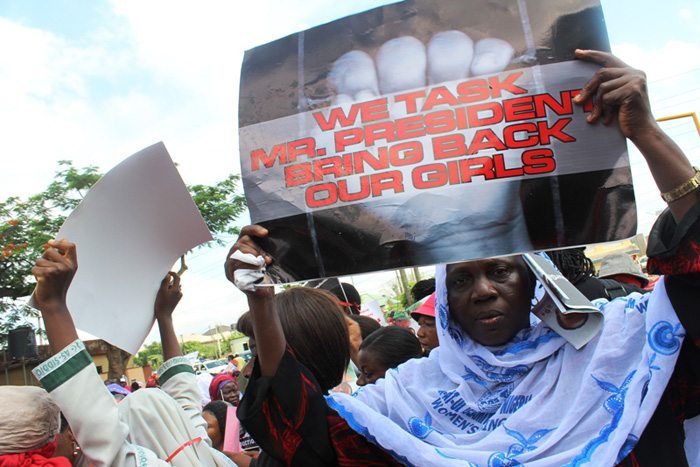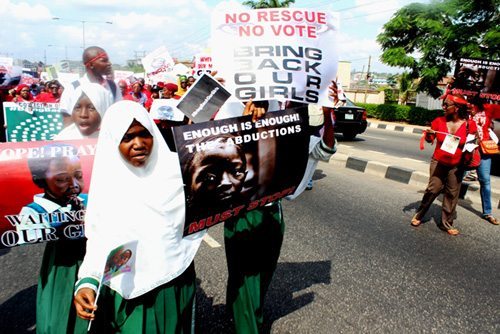‘Bring These Girls Back’: Nigerians Criticize Government’s Handling of Boko Haram Insurgency
On Monday, hundreds of women marched in protest to the Lagos state government house to register their displeasure over the seeming inaction of the government to bring back the hundreds of girls who were abducted weeks ago.

Lagos, Nigeria—This week began with another round of protests in Africa’s most populous country. Hundreds of Nigerians, many of them women, took to the streets of Lagos to protest the failure of the government to rescue the hundreds of young school girls who were abducted three weeks ago by Boko Haram militants in the northeastern state of Borno (Chibok).
The protest follows a similar one on May 1 and others held previously in several parts of Nigeria. Citizens are outraged. They want the government to do more in ensuring the abducted girls gain their freedom.
About 300 teenage girls were kidnapped in the dead of the night from their school dormitory on April 14. Security reports say 53 girls managed to escape, but more than 200 remain missing.
On Monday, hundreds of women marched in protest to the Lagos state government house to register their displeasure over the seeming inaction of the government to bring back the abducted girls. School girls also took part in the protest.
The protesters marched as they raised their voices, chanting “bring back our girls.” Many held placards with various inscriptions. “We want concrete action,” said Victoria Ohaeri, a human rights lawyer and executive director of Spaces for Youth Development and Social Change. “So far we have not seen any sign that something is happening,” Ohaeri added.
“I am sure they [would] have done something fast before now if one of their relations were among the kidnapped girls,” said Modupeola Ashley, a mother and a teacher. “They should bring back [these] children, they are too young to go through this trauma.”
Boko Haram Releases New Video
The Lagos protest came on a day the Boko Haram sect claimed responsibility for the mass abduction at the Government Secondary School in Chibok, Borno State.
In a new video message posted online, the leader of the extremist group Abubakar Shekau admitted he abducted the girls. He also threatened to sell them.
“I will sell them in the market,” he said in the Hausa language of northern Nigeria. “Allah says I should sell. He commands me to sell. I sell women.”
Boko Haram, which means “Western education is sinful,” wants an Islamic state in Nigeria.
In their latest online video, the Boko Haram leader called for an end to Western education and said the girls should get married.
Protesters say the government is failing in its duty of guaranteeing the security and welfare of all citizens.
Militants Continue to Unleash Violence
Borno, Yobe, and Adamawa states are under a federal government-imposed state of emergency, following deadly attacks blamed on Boko Haram. But the militants continue to unleash violence.
Human Rights Watch reported in 2012 that since 2009 the insurgency in northern Nigeria has left more than 1,500 people dead.
And the abduction of the Chibok girls has forced Nigerians to question the will of the government to effectively tackle the Boko Haram insurgency.
On Tuesday, Reuters reported that suspected Boko Haram gunmen kidnapped eight girls from a village near one of their strongholds in northeastern Nigeria overnight.
“They were many, and all of them carried guns,” Lazarus Musa, a resident of the village of Warabe, told Reuters by phone. “They came in two vehicles painted in army color. They started shooting in our village.”
The girls, ranging in age from 12 to 15, were taken away on trucks, along with looted livestock and food.
Government Actions Criticized
Last week, Nigerian President Goodluck Jonathan created a presidential committee to help find ways to solve the mystery surrounding the missing school girls. During a televised media chat on Sunday night, President Jonathan assured Nigerians the girls will be rescued. He also urged parents and guardians of the girls to cooperate with security agencies by providing pictures of the girls for easy identification.
But Nigerians are outraged because it took more than two weeks for the president to make his first official statement on the Chibok school girls. They are also unimpressed with the statement he came up with.
“The president inferred that the families of these girls are not doing enough to collaborate with the authorities to ensure their girls are found. That is ridiculous,” said Kathleen Ndongmo, a human rights advocate and one of the protesters in Lagos.
Ndongmo is equally unimpressed with the newly created presidential committee on the abducted school girls. “This is not a joke,” she said. “We are talking about hundreds of young girls who were kidnapped under [a] very critical situation where we have a history of insecurity.”
She added, “It’s time for government to assure Nigerians that they are doing something, otherwise the trust that we have in the government is already eroded. And we cannot continue to be in a society that doesn’t trust the government.”
Abuja, the capital city of Nigeria, has been bombed twice while hundreds have died at the hands of Boko Haram. The state of insecurity, many say, is becoming embarrassing to the government.
On Monday morning the police arrested Naomi Mutah Nyadar, who led the #BringBackOurGirls protest in Abuja. The wife of Nigeria’s president reportedly ordered the arrest. (She denies the claim.) Nyadar’s purported offense was that she claimed to be a mother to one of the kidnapped girls, though she is not her biological mother. But as Africans, we are all the mothers and fathers of these abducted children, said Femi Falana, human rights activist and lawyer.
Government Under Pressure
Angry Nigerians have vowed to continue to protest what they say is the government’s inaction.

“Our voices are going to put pressure on the government,” Ndongmo said. “If we had not started to protest, we probably would not have heard that a committee would be set up.
She continued, “It’s important we continue to lend our voices to put pressure on [the] government. We need to continue to make the government see that we are there to hold them accountable to the things they are meant to do. And we will carry on.”
Abuja Slated to Host World Economic Forum on Africa
No fewer than 13 heads of state and more than 1,000 delegates from across the globe are billed to participate in the World Economic Forum on Africa (WEFA) beginning Wednesday, May 7 in Abuja. The government has ordered the closure of schools and government offices to ensure the free flow of traffic in the capital. But some believe the government granted the holiday as a result of security concerns.
Nigeria’s minister of finance and coordinating minister of the economy, Ngozi Okonjo-Iweala, has noted that hosting WEFA is not more important than finding the abducted school girls.
“The plight of girls are of the most concern to our government,” Okonjo-Iweala said. “Any country that has the technology, please let them come and help us to bring these girls back.”
